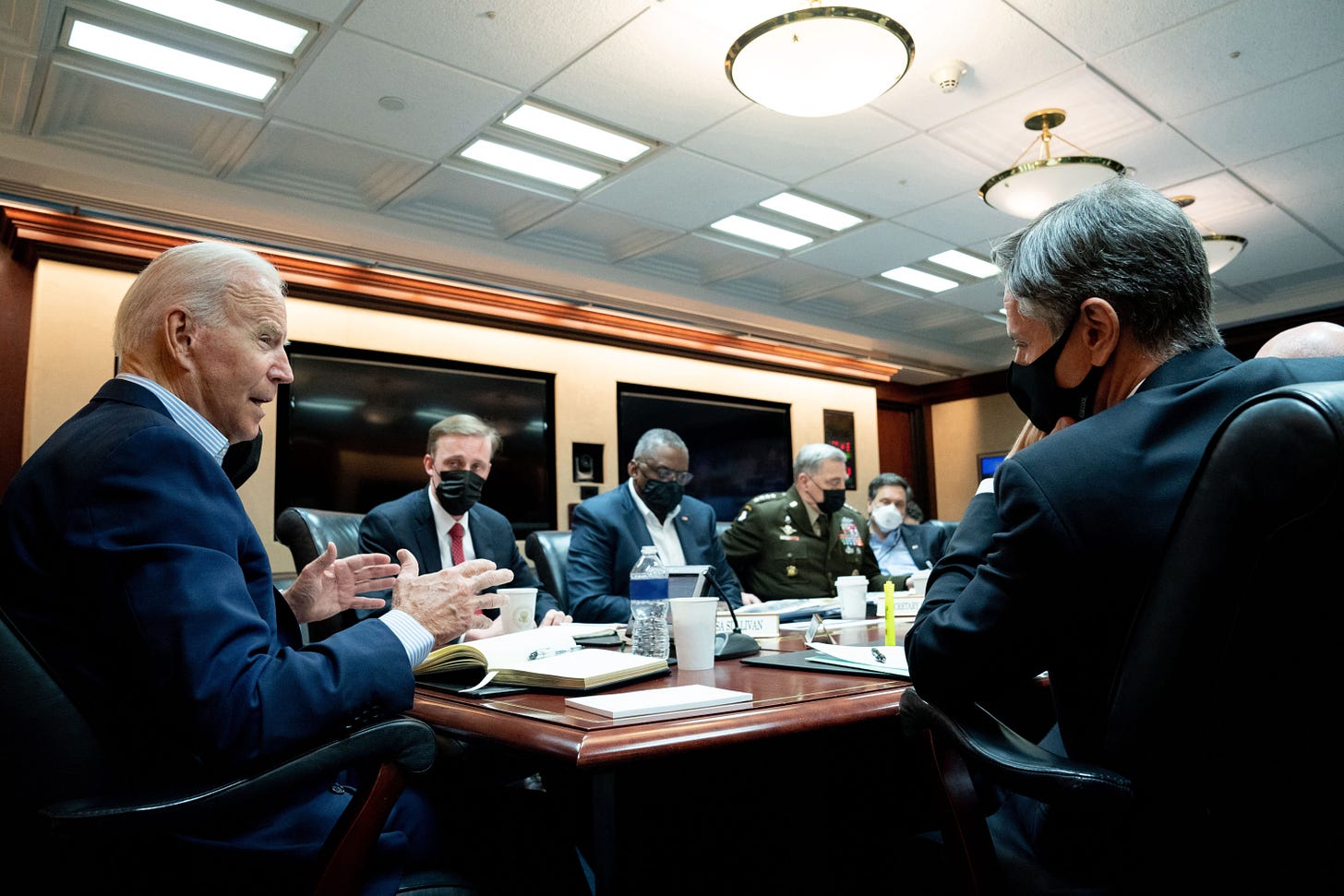Accountability for the Afghanistan Debacle
Some people messed up. We need to know their names, and they should pay a price.

The American exit from Afghanistan has been catastrophic. President Biden, as he himself has said, bears ultimate responsibility for the poor planning and mismanagement of the withdrawal and evacuation. However, just because the buck stops with him does not mean that no one else should be held to account. Indeed, it falls on him—and Congress—to enforce accountability for those in his administration who bear immediate responsibility. People should lose their jobs.
The country doesn’t need scapegoats. It needs responsibility. But more than anything, it needs competence, and some part or parts of the administration have failed to demonstrate it. President Lincoln was famously willing to fire or reassign generals whom he found deficient in prosecuting the Civil War. After the catastrophe of Pearl Harbor, President Roosevelt passed over dozens of more senior officers (some of whom bore some responsibility for the failure to anticipate and prepare for the attack) to put Chester Nimitz in command of the Pacific Fleet. Presidents have either fired, ousted, or accepted the resignation of officials after such failures as the Bay of Pigs, the Black Hawk Down incident, and the Hurricane Katrina recovery. Like his predecessors, President Biden has the duty of holding officials to account for their failures and also of ensuring that effective public servants are in charge—regardless of their previous reputations or his prior opinions of them.
Every part of the vast national security bureaucracy should be forced to defend its role and conduct in the Afghanistan debacle. Did the Defense Department adequately coordinate with other parts of the government and its contractors to ensure that American citizens were safe and informed about how and when to leave the country? Was such coordination consistent with President Biden’s orders? Did they plan and prepare for every contingency?
Did the State Department appropriately coordinate with the government of Afghan President Ashraf Ghani, the allies who also had forces stationed in Afghanistan, the neighboring countries in Central and South Asia, and the many thousands of Afghans seeking to come to the United States?
Did the intelligence community provide the president and the rest of the government with the best possible intelligence communicated as clearly as possible? Did it fail to anticipate what should have been a predictable crisis? Some in the administration have already blamed the debacle in Afghanistan on an intelligence failure. This is possible—such failures do happen—but the intelligence community’s inability to defend itself without disclosing classified information makes it a convenient punching bag. (The intelligence community is defending itself through leaks, claiming that it had warned the policy side of the administration.)
Perhaps the most pressing questions are for the White House chief of staff, Ron Klain, and the national security advisor, Jake Sullivan. They are the gatekeepers for what and whom the president sees, and they are responsible for ensuring the vast bureaucracy of the federal government works coherently. Did they communicate valid concerns, warnings, or alarms from the departments and agencies to the president? Did they run a thorough policy process ensuring clarity of mission and cooperation across the government? In either case, if not, why?
These are questions that Biden should ask. They are also questions that Congress must ask. Democrats control both chambers of Congress, and investigating an administration of the same party is often an awkward task. There may be an impulse to hand off the uncomfortable duty to an independent commission. But the intelligence, foreign relations, and armed services committees are the proper venues for this kind of investigation. They must hold hearings, both public and private. They must demand answers. They must name names.
An investigation might also bring to light individuals who deserve credit for good decisions or courageous actions. Even in disasters like the Afghanistan withdrawal there can be moments of wisdom and honor that deserve credit. We should know the names of the civilian and military officers who pushed back against the president’s making of a catastrophe or who succeeded in making a horrible situation less bad.
If every part of the national security bureaucracy—the department and agency heads, their lieutenants, the senior civil servants and uniformed personnel, and the White House staff—performed well, then the problem is the president. It will be the responsibility of his boss, the American voting public, whom Franklin Roosevelt called “the commander-in-chief of us all,” to weigh the Afghanistan failure in the elections of 2022 and 2024.
Someone—maybe multiple someones—screwed up. The country deserves to know who it was, and that accountability has been served.



